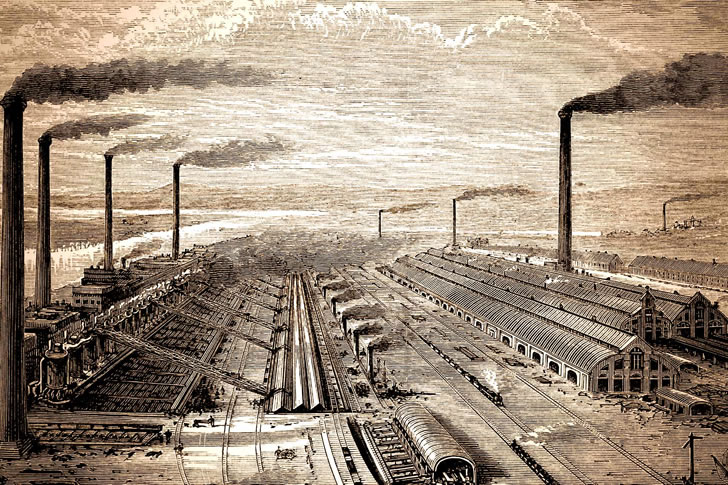Discover the History of the Industrial Revolution: Transforming Society and Technology
The Industrial Revolution, a period of rapid industrialization and technological advancements that occurred from the late 18th century to the mid-19th century, had a profound and lasting impact on society, economy, and technology. This transformative era marked a shift from traditional agrarian societies to mechanized and urbanized societies. Let’s delve into the history of the Industrial Revolution and explore how it revolutionized society and technology.

Origins and Early Innovations:
The Industrial Revolution originated in Great Britain in the late 18th century and quickly spread to other parts of Europe and North America. It began with advancements in textile production, such as the invention of the spinning jenny and water-powered looms, which increased productivity and revolutionized the textile industry. These innovations laid the foundation for further industrial advancements.
Mechanization and the Factory System:
One of the defining features of the Industrial Revolution was the mechanization of production processes. Steam engines, developed by inventors like James Watt, were employed to power machinery, leading to the establishment of large-scale factories. This shift from cottage industries to factory production marked a significant change in the way goods were manufactured.
Transportation and Communication Revolution:
The Industrial Revolution also revolutionized transportation and communication. The development of steam-powered locomotives, such as George Stephenson’s “Rocket,” facilitated the expansion of railway networks, enabling faster and more efficient transportation of goods and people. Additionally, inventions like the telegraph by Samuel Morse revolutionized long-distance communication, transforming the speed and reach of information exchange.
Urbanization and Social Transformations:
The rapid industrialization led to mass urbanization as people flocked to industrial centers in research of employment. This unprecedented influx of people into cities brought significant social transformations. The growth of cities resulted in overcrowded and unsanitary living conditions, leading to the emergence of social and labor movements advocating for workers’ rights and improved living conditions.
Economic Growth and Capitalism:
The Industrial Revolution propelled economic growth and the rise of capitalism. The introduction of machinery and factory systems increased production efficiency, expanded markets, and fostered economic specialization. This led to the accumulation of wealth and the emergence of a middle class, while also exacerbating social inequalities and labor exploitation.
Technological Advancements:
The Industrial Revolution witnessed a wave of technological advancements that shaped various industries. In addition to textile machinery, inventions such as the steam engine, iron smelting techniques, and advances in metallurgy revolutionized industries such as mining, transportation, and manufacturing. These technological breakthroughs laid the groundwork for subsequent waves of industrialization and technological progress.
Environmental Impact:
The Industrial Revolution had a profound impact on the environment. The burning of fossil fuels, increased pollution from factories, and the clearing of land for industrial purposes resulted in significant environmental degradation. These consequences sparked awareness of the need for environmental conservation and laid the foundation for future environmental movements.
Global Spread and Long-Term Impact:
The Industrial Revolution eventually spread to other parts of the world, including Europe, North America, and eventually Asia. Its impact on society, technology, and the economy was far-reaching and long-lasting. It shaped the modern world, laying the foundation for the industrialized societies we live in today, and setting the stage for subsequent waves of technological advancements.
In conclusion, the Industrial Revolution was a transformative period in history that revolutionized society and technology. From mechanization and factory systems to advancements in transportation, communication, and the rise of capitalism, this era had a profound and lasting impact on human civilization. While the Industrial Revolution brought about unprecedented economic growth and technological advancements, it also brought significant social and environmental challenges that have shaped our ongoing quest for a balance between progress and sustainability.







Recent Comments